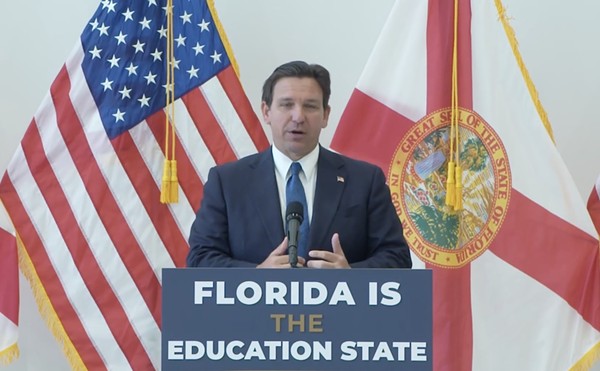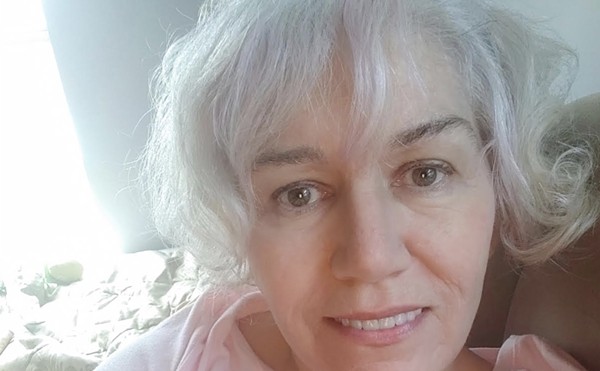There was nothing but smiles and backslapping Feb. 5 as the City Council dished out $206,805 to a group of restaurateurs headed by Bob Snow, the developer who revived downtown Orlando in the 1970s when he built Church Street Station.
Snow, who left hoping to duplicate his Orlando success in Las Vegas and bombed, received the subsidy to finance two restaurants, Panera Bread and Baily's Bistro, in a Church Street storefront below a Hooters Restaurant. The group Snow heads, which put up $1.75 million of its own, also plans live music at an outdoor courtyard and stage and, inside the bistro, a sing-along piano bar. The opening is set for July 4.
Anti-tax advocates say such subsidies are odious because they equal corporate welfare. "It's millions for millionaires," says Doug Guetzloe, head of the Orange County group Ax the Tax. "It's our tax dollars not at work, leaving hard-working people to make up the difference."
Moreover, it's easy to portray the payments -- or "incentives," as the city calls them -- as political payback. Developers feed campaign cash to those who return the favor through tax breaks or, as in the case of the Snow subsidy, by waiving the developer's impact fees.
Indeed, the three entrepreneurs who've benefitted so far from the six-month-old subsidy program, totaling almost half a million dollars, each contributed the maximum $500 allowed to Mayor Glenda Hood's campaign last year. Johnny Rivers, who gave to Hood through one of his companies, received $75,000 for his Conche Me Crazy restaurant in the new Embassy Suites Hotel across from Lake Eola Park. Developer Phil Rampy was given more than $300,000 toward a grocery, restaurant and retail shops in two of his downtown projects: Thornton Park Central and China Glass Warehouse.
But it is Snow -- the only one with a downtown lane named in his honor -- who has lately been the most frequent ally of City Hall, voicing opinions that dovetailed with those advanced by Hood. In the current debate about limiting the number of tattoo shops, Snow has addressed the council three different times as one of only two advocates for the city's position. The 11 opponents at those sessions have had little effect, as the council prepares to puts its restrictions in place.
City commissioners often fawn over Snow when he shows up. But he scoffs at mention that his support has been bought by city dollars. "Anybody who is willing to work within [the city's] guidelines can receive the incentive," he says.
He argues that the relatively small amounts involved in the giveaways go a long way to rebuild often-neglected downtown areas. "Historically, what you are doing is increasing the tax base," he says.
"It's very easy to be anti-everything when you don't have a single good idea," Snow adds.
Tom Kohler, executive director of the Downtown Development Board -- the city-run agency that oversees the subsidies -- cites surveys that complain about the large number of "beer and chicken wing" eateries downtown, versus fine-dining restaurants. Downtown also has struggled to entice upscale retail. The subsidies, he says, are meant to help lure both.
Kohler argues that the subsidies actually save tax dollars by steering development toward the city's core, and thereby reducing the cost required to support development that might otherwise locate on the city's edge, where property is cheaper. "You wind up paying one way or another," he says.
Rampy, the Thornton Park developer, agrees. "As a developer, it's very difficult to build in an urban area," he says. "It's way more expensive than trying to build a Winter Park Village. There's no comparison."
He further notes that cities elsewhere have enticed urban development with subsidies for years. "Orlando is just now catching on," says Rampy.
In Orlando, however, at least one previous subsidy was a flop. The city dumped hundreds of thousands of dollars into Pinkie Lee's, a restaurant and jazz bar in a downtown parking garage across from the T.D. Waterhouse Centre. In spite of the city's efforts -- and help from county and state officials -- Pinkie Lee's filed for bankruptcy in May 1997, leaving a trail of unpaid rent and tax bills.
But Kohler insists there's a difference between Pinkie Lee's and the restaurants that Snow is overseeing. Everything about Pinkie Lee's was wrong, he says, from the location to the city's involvement as landlord. "It was a square peg in a round hole," he says.
Even so, not everyone believes that subsidies will work, especially if they're used for retail on Orange Avenue. Jeff Behr's family owned the kind of retail anchor that city leaders would love to have downtown. His Behr's Shoe Center, which specialized in hard-to-fit men's and women's shoes, filled a location on Church Street adjacent to Church Street Market for 25 years. Behr's eventually moved to a large storefront on Orange Avenue between Jefferson and Washington streets.
But the family sold the business in 1998, citing the rising cost of rent. (Its Orange Avenue space has remained vacant ever since.) "Retail is only good for people working downtown," Behr says. "Can you imagine somebody 45 or older trying to come to my store, trying to find a parking place? They don't want to deal with it."
Downtown, Behr says, is "super for young people. It's a party place. That's all it's good for."
In fact, the only upscale retail outlet left along Orange Avenue these days is Siegel's Clothing Co., which specializes in men's clothing. The store, which has been open for three years (it also has a location on Park Avenue in Winter Park), succeeds by catering to the many bankers and accountants who fill the offices on Church and Pine streets, says John Siegel, the store's owner.
But even Siegel's is waiting, too -- for the downtown economy to change, and for urban renewal to finally arrive.
"As far as attracting new business," Siegel says, "it's a gamble yet to come."

















